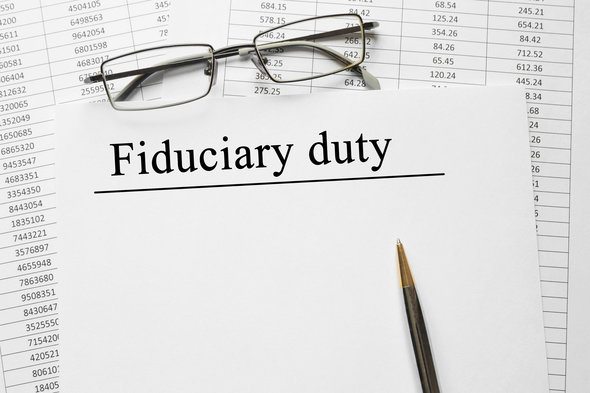The term fiduciary is a good thing to hear if you’re searching for a financial advisor. If a financial advisor is a fiduciary, he or she holds a relationship of trust with a client and abides by fiduciary duty. Fiduciary duty is the ethical obligation to act solely in someone else’s best interest, which in theory should minimize conflicts of interest and make a financial advisor more trustworthy. Read on to learn more about what a fiduciary is and what fiduciary duty entails, as well as how to find a fiduciary to work with.
What Is a Fiduciary?
By definition, a fiduciary is an individual who is ethically bound to act in that person’s best interest. This obligation eliminates conflict of interest concerns and makes a fiduciary’s advice more trustworthy.
The term usually refers to someone who manages assets on the behalf of an individual, a family or a company. This person might be a banker, accountant, executor, trustee, board member, financial advisor or investment professional. In theory, a fiduciary can be anyone to whom you delegate personal, legal or financial choices. In other words, it’s up to you to choose wisely.
What Is Fiduciary Duty?

Also known as fiduciary responsibility, fiduciary duty is the obligation to put someone else’s interests first. This duty is not just a matter of ethics – it’s a legal mandate that ensures that individuals receive the best possible financial advice. The mandate requires that fiduciaries act honestly, diligently and solely for your benefit.
Fiduciary duty protects you and provides a path for legal action should there be a breach of fiduciary duty. It’s like the financial version of the Hippocratic oath – and it’s just as important.
While much of this article address the fiduciary duty that some financial advisors have to clients, fiduciary duty is relevant in numerous types of relationships. For instance, a trustee has fiduciary duty to act solely in the best interest of a beneficiary, an attorney has fiduciary duty to a client and a guardian has fiduciary duty to a ward.
What Is Breach of Fiduciary Duty?
Just as it sounds, a breach of fiduciary duty is when a fiduciary fails to honor his or her obligation. A breach could occur if a fiduciary benefits from his or her recommendations, fails to provide proper guidance or acts in any way that’s averse to your best interests.
Fiduciaries can be held financially and civilly responsible for any actions they make that are not in your best interest. Even if you don’t incur harm, you are entitled to damages.
Are All Financial Advisors Fudiciaries?
Surprisingly, not all financial advisors are fiduciaries. All investment advisors registered with the Securities and Exchange Commission or a state securities regulator are held to this standard. However, broker-dealers, stockbrokers and insurance agents are only required to fulfill a suitability obligation. This means that while they must provide suitable recommendations to their clients, they don’t have to put their clients’ interest before their own. They may suggest products that aren’t in your best interest, or that benefit them more than they do you.
A financial advisor can help you prepare for your financial future. Since that’s an important role, you may want to consider choosing a financial advisor who’s bound to act in your best interest.
How Do I Know If a Financial Advisor Is a Fudiciary?

A 2017 survey by The American College of Financial Services found that 48 percent of people working with a financial advisor did not know if their financial advisor was a fiduciary. There are several resources available that can help you figure that out:
- The National Association of Personal Financial Advisors‘ (NAPFA) has an online search tool that makes it easy to find certified financial planners in your area. Every advisor in that system operates on a fee-only basis and promises to act as a fiduciary.
- Garrett Planning Network is another planner organization of fiduciary financial planners that charge an hourly rate.
- The Certified Financial Planners Board also has an advisor search tool. You can also use its site to search a particular planner’s experience and history.
The vetting process shouldn’t stop there. Once you identify potential advisors, here are the sorts of questions you should be asking to ensure that the advisor suits your needs and has minimal conflicts of interest:
- How are you compensated?
- What qualifications do you have?
- What services do you offer?
- How often are you willing to meet?
- What type of clients do you typically work with?
- Can you provide a written guarantee of your fiduciary duty?
You should also request a copy of a financial advisor’s Form ADV (SEC-filed paperwork), which provides information about an advisor’s business, pay structure, educational background, potential conflicts of interest and disciplinary history. That information is also available online through the SEC’s Investment Advisor Public Disclosure tool. You can also request a performance record and list of client references to contact.
Tips for Finding a Financial Advisor
- Do your homework. Be sure to ask questions. Request a copy of a financial advisor’s Form ADV. Take note of an advisor’s fee structure, certifications and any disclosures.
- Ask around. Word of mouth can be a useful resource. Asking friends or family members for recommendations can be a good way to gauge how capable and reliable a financial advisor is.
- Use a matching service. Finding a financial advisor can be a daunting process. A financial advisor matching service does the work of finding a financial advisor for you. Our SmartAdvisor tool can match you with up to three financial advisors in your area in just a few minutes. All you have to do is answer about 20 questions about your financial situation. Then you can check out their profiles, interview them on the phone or in person and choose who to work with in the future.
Photo credit: ©iStock.com/Ivan-balvan, ©iStock.com/Michail_Petrov 96, ©iStock.com/AJ_Watt
